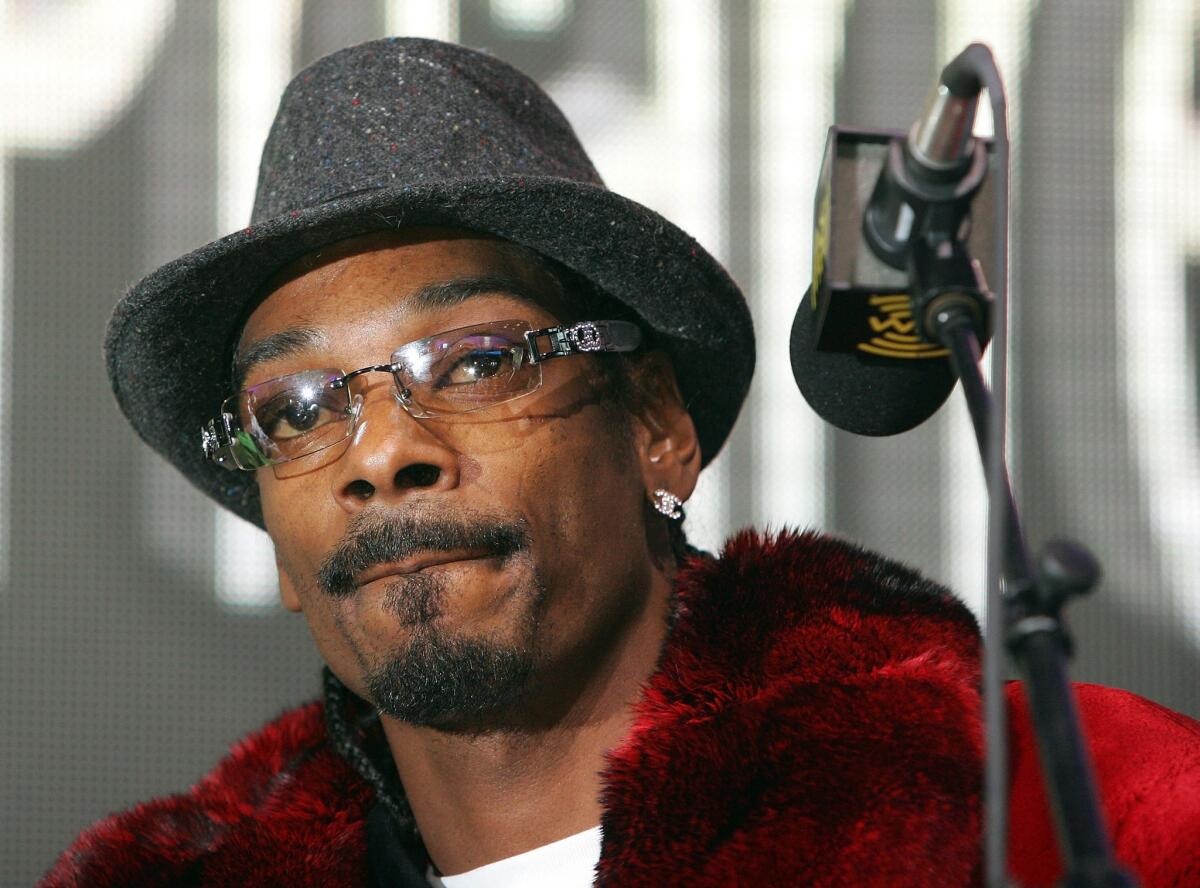Snoop Dogg music video sparks legal battle with India religious group

Snoop Dogg is interviewed at the XM Satellite Radio booth at the International Consumer Electronics Show in Las Vegas on Jan. 5, 2006.
- Share via
reporting from Mumbai, India — A music video featuring the rapper Snoop Dogg and an Iranian pop singer has become the subject of a legal battle in India, where members of the Parsi community say it should be banned because it demeans their Zoroastrian religion.
The 3 1/2-minute video for the song “King,” released on YouTube last month, shows Snoop Dogg smoking weed while sitting on a throne topped by a giant gold Faravahar, the winged disc that is among the most revered symbols of Zoroastrianism.
The rest of the video features Iranian-born Amitis Moghaddam -- dressed as an ancient Persian queen, lying beneath a Faravahar and being fanned by two negligibly clothed men -- interspersed with scenes of women pole-dancing.
A Parsi civic organization has filed suit against Snoop Dogg, Moghaddam, YouTube and other defendants in the eastern city of Kolkata, saying the video is “insensitive towards the religious beliefs of one of the oldest monotheistic religions in the world.”
The public-interest lawsuit is also rooted in a sense of deep unease among the Parsi community, one of India’s smallest religious minorities, whose numbers have been declining for decades.
Descendants of Persians who fled religious persecution in Iran more than 1,000 years ago, Parsis have long held outsize influence in Indian cities such as Mumbai, the financial capital, where they built hospitals, universities and the city’s first port.
India has the world’s largest population of Parsis, but while they numbered 115,000 in the 1940s, by 2001, the most recent year for which official statistics are available, the community had shrunk to 69,000.
Parsis prohibit conversion to Zoroastrianism, and due to their economic success, many are waiting longer to marry and have children, reducing their fertility rates. The Indian government started a campaign to encourage Parsis to procreate, including ads in Parsi publications with half-joking messages such as: “Be responsible. Don’t use a condom tonight.”
“Parsis for the first time have started to feel insecure as none care for their religious beliefs due to their dwindling numbers,” Phiroze Edulji, attorney for the plaintiffs in the music video case, wrote in the lawsuit.
The plaintiff, Darayas Jamshed Bapooji, president of the Parsi Zoroastrian Assn. of Kolkata, said in an interview that he was seeking for the video to be pulled from YouTube. The lawsuit also names the Indian government and the music video hosting companies Vevo and Vydia as respondents.
“We being such a small community, our heritage should not be looked down upon,” Bapooji said in an interview. “We are very proud people, we take pride in our religion and we cannot afford for anyone to do such things.”
Zoroastrians trace their faith to the Bronze Age prophet Zoroaster and worship fire as a symbol of God. The Faravahar represents the eternal spirit of the human being and features three layers of feathers, two streamers for the duality of good and evil, and the left-facing head of a man, Zoroaster.
Moghaddam, who performs under her first name, Amitis, lives in the Atlanta area but sings most of her songs in Farsi. As a native Iranian, she should have known the video would be offensive, Bapooji said.
“It was done on purpose, we feel,” Bapooji said. “She should be very much aware of what is what, even if Snoop Dogg wasn’t.”
The video has hardly been a YouTube smash. Since being released June 1, it had less than 82,000 views as of Monday morning. The video for “California Roll,” by Snoop Dogg with Stevie Wonder and Pharrell Williams, published May 20, has been seen more than 7.3 million times.
A hearing in the case is scheduled for July 17.
For more news from South Asia, follow @SBengali on Twitter
More to Read
Sign up for Essential California
The most important California stories and recommendations in your inbox every morning.
You may occasionally receive promotional content from the Los Angeles Times.











